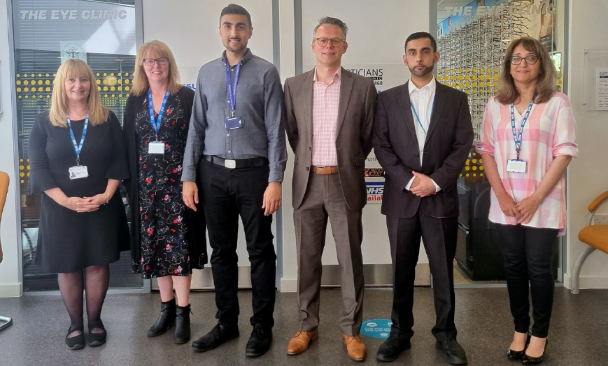Collaborating In Practice – the Benefits of Building Strong Working Partnerships
20 November 2023
Wasim Sawar, recently organised a series of visits to three very different local optometry practices.

In a proactive effort to strengthen partnerships and foster collaboration with key local stakeholders, Primary Eyecare Services’ regional clinical lead for the West Midlands, Wasim Sawar with the Local Optical Committee recently organised a series of visits to three very different local optometry practices.
Among attendees was the chair of Solihull Local Optical Committee (LOC), Spencer Parkes, and representatives of the local Integrated Care Board (ICB) – Sarah Watson (Senior Transformation Manager) and Esther Whitten (Clinical Quality Manager).
The joint objective for the day was to witness the local enhanced services in action within the community and talk to the practitioners about their work.
The practices selected to host the visits comprised two multiples and one independent practice. Practitioners and members of the wider practice teams enthusiastically welcomed the chance to showcase their services to their visitors.
A particularly insightful visit took place at an independent practice situated within a medical centre, allowing discussions with the practice manager who provided supportive feedback regarding the referral of patients for urgent eye care to local practices.
The initiative proved to be an insightful and mutually beneficial experience, highlighting the numerous benefits of working collaboratively, including:
- Strengthened partnerships: the visit served as a platform for eye care professionals and practice stakeholders to establish or strengthen relationships. This collaborative approach is essential
- Enhanced understanding of day-to-day challenges and opportunities: our NHS stakeholders, gained a deeper understanding of the challenges and opportunities faced by optometry practices. By witnessing hands-on discussions and activities engaging directly with the optometry teams, they gained a more informed perspective on which to base future decisions
- Ongoing knowledge exchange: the visits facilitated a two-way exchange of knowledge. While eyecare practitioners showcased their expertise in patient care and clinical practices, practice stakeholders shared their insights on business operations and challenges as well
- Better business sustainability: for optometry practices, the collaboration with NHS stakeholders and their understanding of the business considerations can contribute to long-term sustainability
Maintaining the Momentum
Speaking about how positive and powerful these face-to-face meetings were, Wasim explained how similar events will be set up in the months to come, saying:
‘Looking ahead, we have plans to conduct more visits in 2024 specifically for Birmingham and Solihull, and we have already scheduled practice visits with the Chief Medical Officer and other senior members of the Black Country ICB in January 2024.
This move reflects our commitment to fostering strong relationships, sharing insights, and ensuring the continued success of eye care services in collaboration with our valued partners. It also marks the beginning of a closer, more productive relationship between eye care professionals and NHS stakeholders. We believe that working in partnership hugely benefits both practices and patients.
The stage is now set for ongoing collaboration and dialogue and we can all look forward to connecting more closely in future.’
Speaking about his impressions of the day, the LOC chair, Spencer Parkes, commented:
‘The visits proved to be a highly fruitful exercise. We went to see three very diverse optical practices, representing the breadth of practices in our footprint.
We very much appreciated the optometrists allowing us into their practices. They took the time to showcase the patient journey, the processes for completing electronic forms, and the intricacies of CUES episodes and the IT system used.
We all gained a better understanding of our clinicians; experiences and perspectives – and how we can support them in future to continue to deliver such a valuable, and valued, service to our local communities.’
The participating practitioners were equally as enthusiastic about the exercise, with one commenting:
‘After the pandemic, in-person meetings were very rare, so we took the opportunity to connect with our key eye care local contacts and help them understand what optometrists like me experience on a daily basis.
They were genuinely impressed to see that various locations and practices could provide excellent care with great outcomes for all patients, regardless of their different needs and diverse backgrounds.’
Future-Proofing Success
There can be no doubt, given the open, transparent and supportive nature of the discussions on the day, that collaborative efforts between eye care professionals and NHS stakeholders have the potential to significantly move the quality of patient care forward.
The CEO of Primary Eyecare Services, Dharmesh Patel, sees this as just the start of a new period of closer working between stakeholders and the catalyst for long term stability within the sector, saying:
‘As our collaborations continue to evolve, our aim is to create a win-win situation for all stakeholders ensuring that patients receive the best possible care and that optometry practices remain sustainable and resilient in an ever-changing landscape.
By witnessing hands-on discussions and activities engaging direct with the optometry teams, our visitors left with much more informed perspectives, and therefore a stronger basis for making future decisions.’
By working closely together, our stakeholders – along with ourselves – will become increasingly more strongly positioned to identify and implement best practices, innovative solutions and patient-centred initiatives that benefit local communities.’